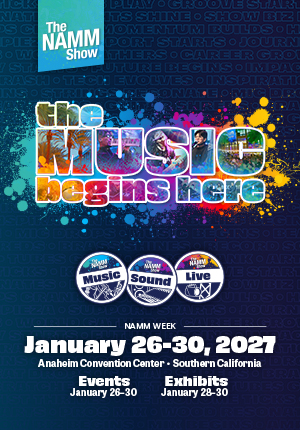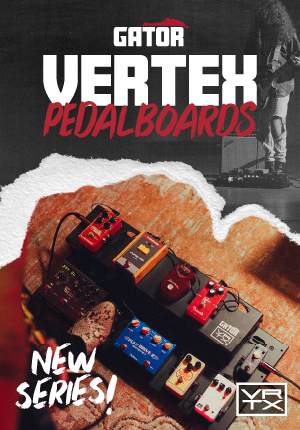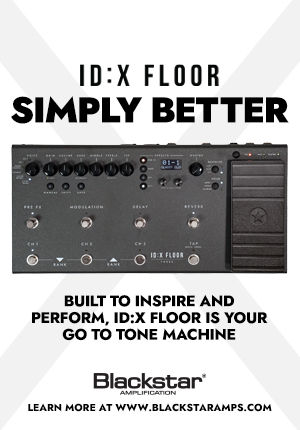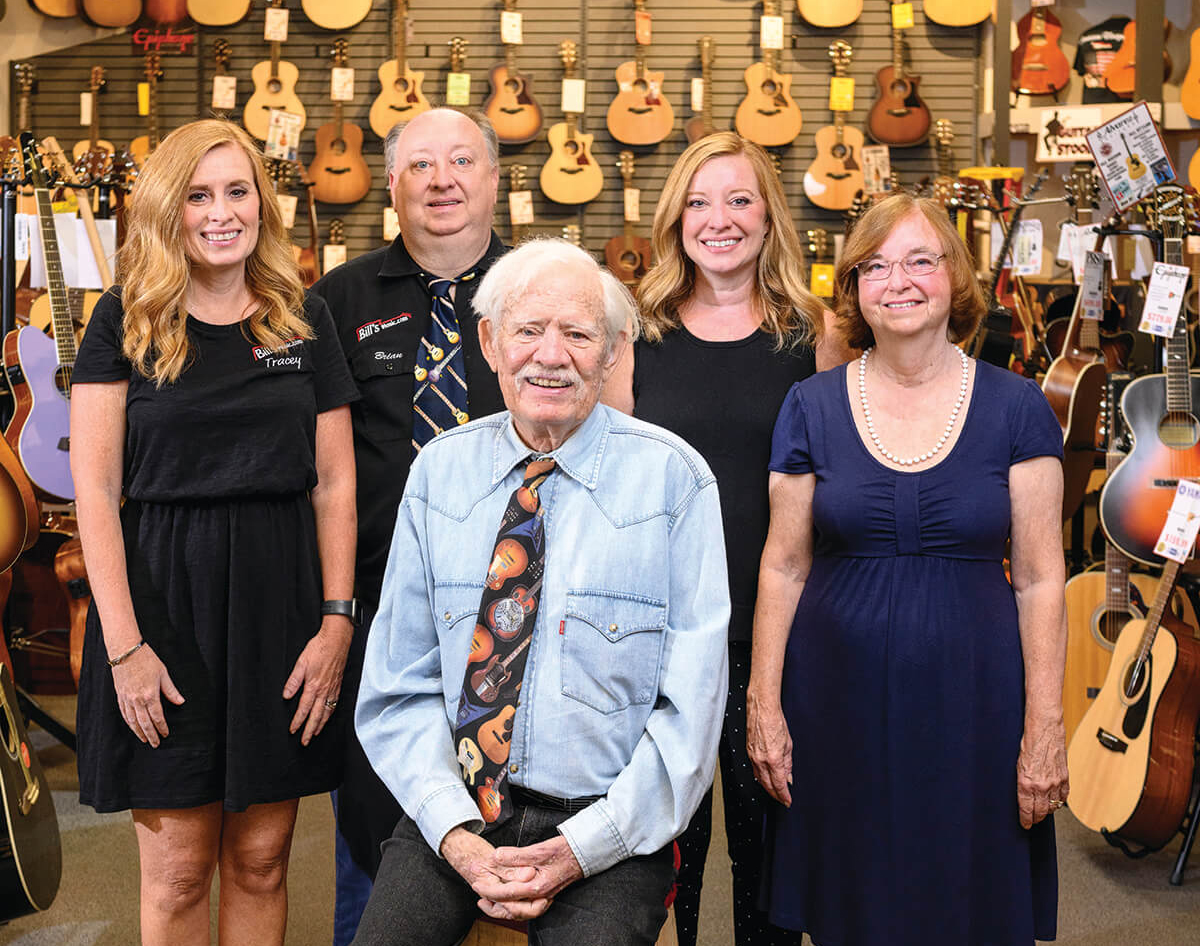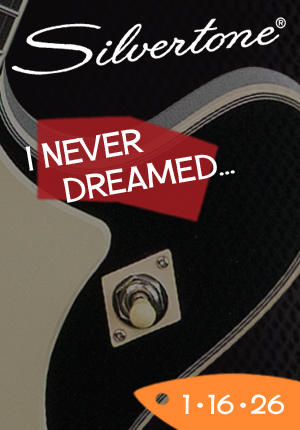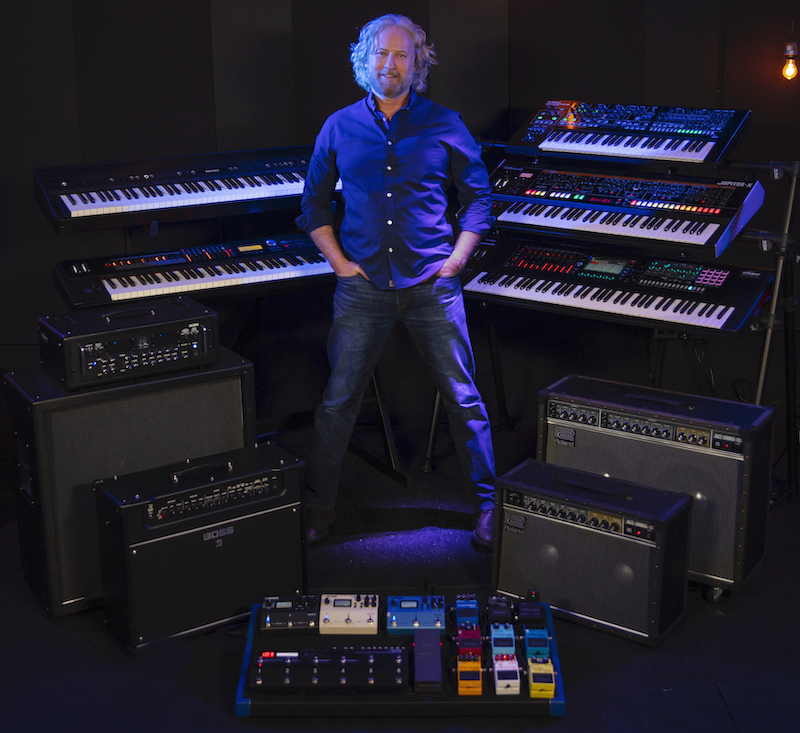
Tony Price
HQ: Los Angeles
Founded: 1978 (U.S. operation)
Employees: 170
Best selling product: Roland digital pianos; Boss amps and effects.
Fun Fact: Though Price has worked in Japan before as part of American and German companies, Roland is the first Japanese-owned company he’s been a part of. In non-pandemic times, he travels to the country frequently. “I love the Japanese company culture,” he says. “It’s been something new for me. I speak maybe 10 words of Japanese! But the work ethic, the respect and the innovation are great.”
How do you start your day?
I try to get a solid night’s sleep and wake up early to have a good breakfast, exercise and check out the morning’s sales reports. From there, I follow the philosophy of tackling hard things first. I have a long to-do list of challenging tasks that I try to get out of the way before my first meeting, so I can feel like I accomplished something early.
What are some of those hard things on any given day?
Most of the time, they’re related to one of our large ongoing projects. There’s day-to-day business associated with each of those, and then usually some fire that needs to be put out. Regardless, it’s all related to the big goals we’ve set as a company and various forward-thinking initiatives that are in the works.
Are you able to tell us about any of those big projects?
One is called the Conversion Partner Program. We use digital marketing to help customers have a great experience connecting with our best retail partners — and then have more great experiences once they get there. It’s a big global initiative throughout Roland.
What do you find most exciting about being at Roland right now?
We launch a lot of cool products every year and, since I’m a true gear person, I’m always blown away. I’m thrilled by the new products that come out and how deep they can be. Some parts of the MI industry focus more on mojo than technology — some guitar brands, for example — but our new products are so innovation-rich that it’s always fun to dive in and find out what’s behind them. I love being part of a company that’s so prolific, with such interesting products.
What role do you and Roland U.S. play in product development?
The process starts when the global business unit comes up with a portfolio of ideas that they’ve gathered by talking with customers around the world. They present those ideas to every sales unit, including us in the U.S., and we contribute our thoughts before they present their final ideas to Roland’s board. That way, we make sure that the voice of the U.S. market is represented in the process.
With Roland’s wide product portfolio, how do you keep everything straight?
We have great product teams that integrate with sales and marketing, so we all stay up to speed on how products are being placed and communicated to the market. All the categories are doing really well right now, but in times when one is underperforming for any reason, it’s valuable to have balance and diversity across categories. That includes video switchers and streaming products, which most people don’t know we make. We’ve been in the video space for over 20 years, and it’s super-hot right now given how much time people are spending at home watching digital video.
How would you describe your leadership style?
When I took this role, I inherited a flat-and-open organization, which fits my leadership style well. I’ve tried very hard to preserve those qualities in the company. We have a great team and so many great ideas, so why create a hierarchy that could limit sharing? Beyond that, I try to know as much as I can about every key business area, so I can dive deep if there’s an issue or I need to brainstorm and understand certain concerns or opportunities.
Where do you focus most business-wise?
Sales is my strength and marketing is a secondary focus. Those areas are the easiest for me to gravitate towards because I’ve been involved in them for a long time and know what to do. When it comes to finance and administration, I tend to trust the folks on my team, but at the same time, I try to learn as much as I can so I have enough knowledge to dive in deeper as needed.
What’s the trickiest part of your job?
Month-end reporting can be tough, since there’s just so much of it, but then again, I really like the endpoint where I can look back and analyze the previous month’s results. Other than that, before the pandemic, commuting to work in L.A. traffic was the worst part of it. [Laughs.]
What’s your musical background?
Like a lot of people in the industry, I grew up playing music. I started with trumpet and then moved to guitar and singing. From age sixteen on, I was playing in nightclubs. In college, I minored in music and played full-time. I had a couple brushes with fame with major record label development deals, and I was also the audio engineer on campus, so there are a lot of different backgrounds there. I still love to perform, especially playing singer-songwriter type shows, though obviously, now during the pandemic isn’t the best time to be out gigging. We also have a lot of fun in the office with our Make the Month band — our Christmas cover band — and take time to perform during our holiday celebrations.
And on the MI business side?
I’ve always been on a career path that’s been connected to music. I was in commercial sound and pro audio for a long time, and then retail and manufacturing for more organic, mojo-oriented products, like I mentioned earlier. I’ve also spent a lot of time on the tech side because I have a real passion for music technology. Working at Roland pulls all of that experience together.
Given Roland’s strong hardware legacy, has it been challenging to get customers to warm to software offerings like Roland Cloud?
Not really, because it’s all part of the same ecosystem. Roland Cloud lets you download more than fifty high-quality Roland instruments, and the compatible hardware ties in with the software smoothly. If you buy a Roland hardware product, it’s a natural progression to subscribe to Roland Cloud. And if you already have a Roland Cloud membership, you may want to buy different pieces of hardware or a few Lifetime Keys for different purposes and applications. Overall, we see Roland Cloud as a hub for music creation that allows you to go cross-platform, even with smartphones and tablets, so you can create and work seamlessly between hardware and software. It’s not really the tyranny of the or — it’s the genius of the and. Everyone I’ve spoken to who has a Roland Cloud membership loves it, and we see it continuing to build. We’re just at the beginning, and I’m excited to see where it goes.
How do you approach curating the legacy of a company that’s had such a big impact on the MI world?
Roland has an amazing legacy of iconic instruments, and we reflect that in the Jupiter series and Roland Cloud Legendary series, for example. But Roland is really about the future and what’s happening next, designing the future of music creation. The great thing about this company is that our global CEO has been with us since 1977. The creators of a lot of our current products were the creators of Roland’s big legacy products as well. To me, the legacy lives on through people and creativity that span different eras.
When you learn about new product releases, can you tell which are going to be the biggest hits?
There are obvious no-brainers, but most interesting are the ones where we are really pioneering something or innovating a category. With the TR-808 Rhythm Composer, for example, it came out and the market didn’t know what to do with it at first. So, it got left behind and rediscovered later. Some products may be game changer hits right away, but for others like the TR-808, it takes longer for the message to consumers to really resonate.
Can you cite a more recent example?
The Waza-Air Wireless Personal Guitar Amplification System. It’s not inexpensive, but it has really interesting technology inside. It’s basically a guitar amp that you put on your head and wear like a pair of headphones. It hasn’t been done before. People may see it as unusual, but once they put it on at a trade show and play with it, the reaction is normally “Wow!” Once I saw that reaction, I knew that the product would resonate with the market and the message would spread — and it did. It’s been a really hot product for us.
How has the flow of business changed during the pandemic?
There used to be a lot more people traveling back and forth. Now, the challenges are more in terms of time zones, because we have leadership in both Europe and Japan, so conference calls can be scheduled at odd times. We’ve missed the personal contact as most people have, but we’re still very closely connected with our leaders and teams around the world. Here in the U.S., we have a skeleton crew in the office, and most people work from home right now. The transition to remote working went very well. If things weren’t working so well, we’d have more urgency to find a way to safely get more people back in person.
If not music, what would you be doing?
That is so hard to imagine! I have a passion for building business, and as long as the products and mission inspire me, it could be anything.

